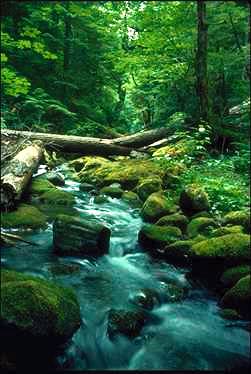6 September 2005
Road De-Icing Threatens U.S. Aquatic Habitats
by Kate Melville
 It seems that even the most innocuous of human affairs can have a dramatic impact on the environment. Scientists from the University of Maryland Center for Environmental Science have found that fresh water systems in Maryland, New York and New Hampshire are becoming saltier due to de-icer use on roads and highways. The researchers say the problem is growing worse because of the growing number of new roads and the increasing frequency of de-icing.
It seems that even the most innocuous of human affairs can have a dramatic impact on the environment. Scientists from the University of Maryland Center for Environmental Science have found that fresh water systems in Maryland, New York and New Hampshire are becoming saltier due to de-icer use on roads and highways. The researchers say the problem is growing worse because of the growing number of new roads and the increasing frequency of de-icing.
The researchers, whose report appears in the Proceedings of the National Academy of Sciences, used historical records spanning the last 30 years and direct measurements to quantify the changes in salinity and predict what would happen if current trends continue.
Because salt accumulates in groundwater and aquifers, some aquatic systems in the north-east already exceed the recommended standard for the protection of aquatic life of 250 mg/l of chloride. In developed areas of Baltimore, chloride concentrations were already high enough to cause death in aquatic animals and alter wetland plant composition.
And in the winter months, chloride can increase in waterways to levels as high as 5 g/l, equivalent to 25 percent of the concentration found in seawater.
"It is surprising and significant that the long-term record shows that salinity concentrations are going up, even in places where the amount of salt applied has not increased. Concentrations are high in the summer, not just in the winter when salt is applied to melt snow, suggesting that salt is accumulating in the environment," said Dr. Peter Groffman, of the Institute of Ecosystem Studies.
The report contends that if current trends continue over the next century, many surface waters in the region could become unfit for human consumption and toxic to some aquatic life. Reversing the problem may be difficult as it would involve limiting the creation of new roads and reducing de-icer use. More worrying is the fact that despite being a major aquatic pollutant, road salt is not currently regulated as a fresh water contaminant.
"There is a direct connection between the rate of construction of new roadways and parking lots and the quality of our fresh water. In particular, we have not paid enough attention to rapid changes in human development and de-icer use in watersheds that supply our drinking water and provide habitats for many species of aquatic life," concluded researcher Sujay Kaushal.
Source: University of Maryland Center for Environmental Science
